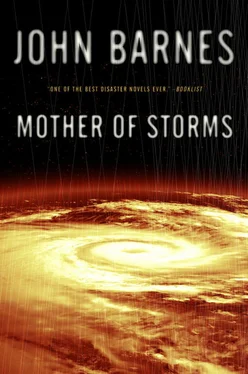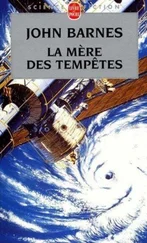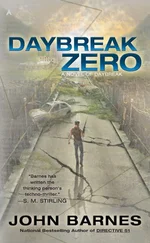Publicly, she will accept delivery of the NOAA scientists’ work in a couple of days, but this secret report is the truth—or as near to it as a computer model can get. Publicly, she will share the NOAA report with the UN, and Rivera will base policy on it.
Which means publicly, the policy will fail, because it is based on inaccuracies, and she will be in a position to use this to advantage.
The only problem now is that what is in her hands is so very much worse than she had imagined. One of the nice NSA men—a soft-spoken young African-American who looked like a bright law student or high school teacher—carefully explained to her that things did not scale up in a linear way, and that “not linear” meant “double the input does not mean double the output—it means, maybe, quadruple it, octuple it, cut it in half… the functions are complicated.”
So while the public version, on which the UN will act, shows that next summer will bring the twenty biggest hurricanes, typhoons, and cyclones in history, plus a blistering drought in the high latitudes and monsoons beyond historical experience in the tropics; while that report shows the snows of East Africa turning to glaciers and a real risk that the Colorado may stop flowing; while it shows world deaths from famine, flood, and storm running into the tens of millions—it’s all a fraud based on wishful thinking.
The real numbers show something more like seventy hurricanes, and many of them far beyond historical scale. There’s no drought, but the rain cycle accelerates tremendously—they’re going to lose some big dams, and many of the dry lake basins in the West will begin to fill. Between the storms and the change of climate, they can expect major blight outbreaks in the world’s forests, and plenty of crop failures. It probably isn’t possible to save the Netherlands, and it is definitely not possible to save Bangladesh or most of the world’s delta populations. There’s no question that they’ll lose some populated Pacific Islands entirely, and it looks suspiciously like in the Southern Hemisphere the Antarctic glaciers will grow rapidly all through southern winter and then melt even more rapidly in October and November. There is no way yet to predict the consequences of that.
The real numbers show deaths running to 270 million worldwide by September.
More than a quarter of a billion people.
There is nothing the United States, or the United Nations, can do to save most of them. The USA does not have the economic weight and muscle anymore to lead the world… hasn’t had it in a long time, but that’s something Hardshaw learned early that you never say in front of a voter. For twelve years since the Flash, when the government and at least threequarters of all the financial records in the country ceased to be, she has been struggling to put American power back together again, first as American Ambassador to the UN, then as Attorney General, and finally as President.
She’s fought to preserve what is left of American national sovereignty, to get any momentary advantage that can keep the Republic from being pulled down into a tight orbit around the UN. She has preserved big enough armed forces to act unilaterally, allied herself with any and all powers willing to take on the Secretary General, squeezed every bit of wriggling room from the UN—at the same time that, after the terrorist nuking of Washington, the Federal government was running a third of its budget on UN loans.
Once again, Harris Diem has been her right hand in this. He put the operation together like a pro. Even the developing leak between Carla and Louie Tynan is happening days later than he thought it would, and not affecting their plans at all.
And now, finally, she has in her hand real information—real information that she knows the UN does not have and needs badly.
Let the UN get it wrong, and it will go down. The Global Riot showed that clearly enough, and this is much bigger than any mere public scandal. She can do a lot more than just regain American sovereignty—she can collapse the “world government that dare not speak its name,” as she and her circle have called it for many years.
For fifteen years she has worked to put the United States back where it belongs, beyond the command of any foreign power.
All she need do is put together the secret team that will be ready for the real situation. They will still lose New Orleans, Tampa, Miami, Corpus Christi, but they’ll get through it. And the rest of the world will go to hell. Unless the UN figures out the truth and acts on that.
And if the UN does get it together… there goes the American bid for supremacy, probably forever.
The NSA tells her that they can’t predict what the UN will do if she gives them the accurate report. In any case, in a few months, when it’s probably too late, they’ll know they’ve been had, and perhaps as they go down they can pin the blame on her. That will be all right; if it comes to that she’ll walk right into the General Assembly and let them shoot her with a short pistol, put the whole blame on her—as long as the UN goes down and America comes back up.
But probably, NSA says, if the UN gets things together—they can hold deaths down to 100 million people worldwide. So if Brittany Lynn Hardshaw chooses to do what she had been planning to do—170 million unnecessary dead.
It will certainly put her in the history books. She’ll beat Hitler, Stalin, and Mao combined.
And if she hands the UN the truth—that involves telling NOAA the real numbers and probably admitting what the original plan had been, with impeachment likely to follow if Congress wants to save the shreds of American autonomy. More than that, it throws away the very last shot at full American independence.
She looks up at the portraits hanging on the walls; she picked them carefully—Washington, Adams, Jefferson, and Madison, because they founded American independence; Lincoln, who saved the Republic; Truman, Eisenhower, and Kennedy, who armed it to the teeth. In fairness, perhaps, she should have included Franklin Roosevelt for the same reason—but he founded the UN.
“So what would you all do?” she asks them, and jumps at the sound of her own voice. She hadn’t meant to speak aloud.
The two reports lie side by side on the desk, and she looks at their all-but-identical covers for a long time, trying to see any other choice.
After the awkward way things started, Klieg would never have bet that this first date with Glinda Gray could go so well. She was exactly right—Derry seems to be delighted to have him interested in her mother, and the “luncheon at a little café where the crab is real and the atmosphere phony,” as he described it to them, was a big success. Now he and Glinda, having decided to just sit and watch Derry go by on a horse every so often, are out on the “parents’ patio” and having a drink together; mostly they’ve been talking about growing up in the middle of America, and about how few people anymore seem to have any real ambition or drive for wealth.
They’ve also been flirting a lot, and in one bold moment—grinning to make it a joke, but doing it anyway—she slid her high-heeled pump up his trouser leg. He grinned back to show he got the joke, but at just that moment he might have done anything for her.
There are flies all around—this close to horses it’s inevitable—and the two of them are constantly swinging and slapping at them. He doesn’t know what it makes him look like, but it makes Glinda’s blonde hair flip around in interesting ways—which he doesn’t get much of a chance to observe since he’s pretty busy swinging at flies himself. His best guess, from the way she smiles every so often, is that he looks pretty awkward doing it.
They talk on about all sorts of things. The last serious girlfriend that Klieg had, years ago, used to complain that all he talked about was “business, food, and the best brand of everything.” There was a certain amount of justice in it, he had to admit, but the great thing is that that seems to be what Glinda talks about as well. They talk about what kind of cars they’re going to get next year—they’re both eager readers of Consumer Reports —and where to get good cheap Mexican food that doesn’t put you at any risk of spoiled ingredients, and the relative merits of Denny’s versus Shoney’s when eating out of town. They talk about new carpeting, which both of them have gotten within the last couple of years, and about whether or not the newer editions of The Joy of Cooking are as good as the “classic” version.
Читать дальше












